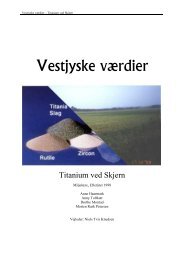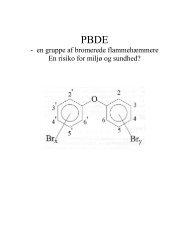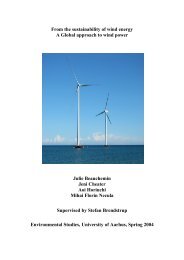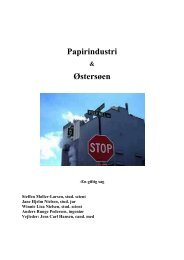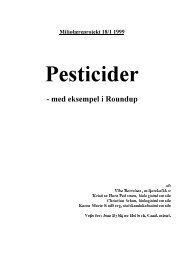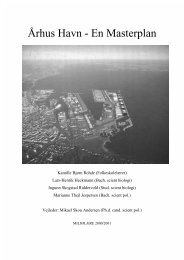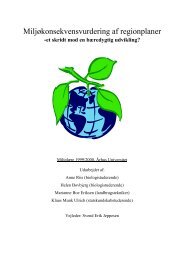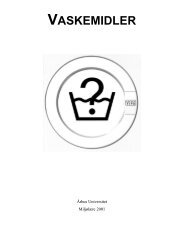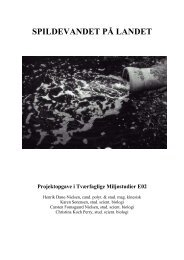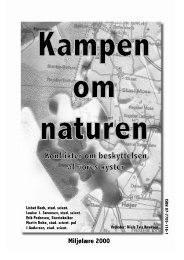University of Aarhus ECOTOURISM AS A WAY TO PROTECT ...
University of Aarhus ECOTOURISM AS A WAY TO PROTECT ...
University of Aarhus ECOTOURISM AS A WAY TO PROTECT ...
Create successful ePaper yourself
Turn your PDF publications into a flip-book with our unique Google optimized e-Paper software.
Ecotourism as a sustainable way to protect nature<br />
d. Massive extraction <strong>of</strong> marine resources (marine fisheries)<br />
There are indications that artisanal fishing is affecting exploited marine<br />
communities. They are not only affecting the target species, they also have a<br />
cascading effect on non-commercial species and the ecosystem in general<br />
(Ruttenberg, 2001)<br />
Management and control <strong>of</strong> the marine resources have been very poor<br />
before 1986, and after 1986 it has been run by “everyone and no one”, the navy,<br />
the ministry <strong>of</strong> Industry and fishery, and INEFAN (the national service that falls<br />
under the ministry <strong>of</strong> Agriculture and livestock). But lack <strong>of</strong> management and<br />
control has allowed the overexploitation <strong>of</strong> the marine resources.<br />
In recent years local fishermen (many <strong>of</strong> them new arrivals), commercial<br />
fishing, and trawlers (many foreign) have been doing illegal and highly<br />
destructive commercial fishing within the marine park for lobsters, tuna, sharks,<br />
grouper and sea cucumber. Japanese ships are frequently spotted just outside the<br />
reserves, where they sell their illegal catches. Divers also report findings <strong>of</strong> dead<br />
sharks, sea lions and turtles attached in nets. There are also reports that boats<br />
from mainland comes to exchange sea cucumbers with prostitutes and drugs<br />
(Honey, 1999).<br />
For two decades a battle has been going on between the national park<br />
service and fishermen and industrial fishing groups, about how the marine<br />
reserve should be used.<br />
In 1994 Ecuadorian television showed shocking footage <strong>of</strong> large<br />
clandestine encampments <strong>of</strong> sea cucumber fishermen, who were diving into<br />
shallow waters and collecting an estimated 150.000 cucumbers per day. The sea<br />
cucumbers were clandestinely exported to Japan, Taiwan and Hong Kong,<br />
where they were eaten or used in medicines. Shortly after the illegal camps were<br />
shown in television, park guards and tour guides discovered 86 butchered giant<br />
52



